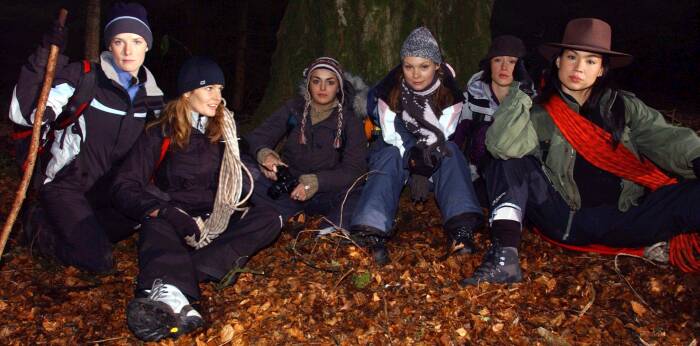
★★★★
“Six chicks with picks.”

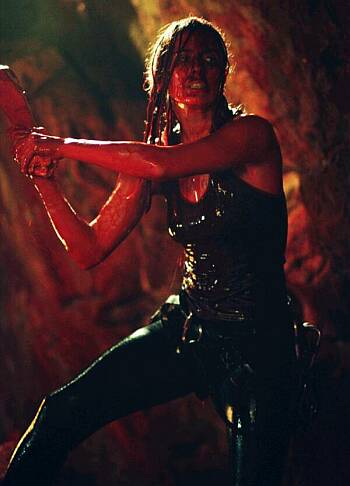 Simplicity is under-rated, especially when it comes to genre films. The simplest horror movies often work the best, because they prey on widely-held fears: monsters (Jaws), getting lost (The Blair Witch Project) or claustrophobia (Below). And now, we get The Descent, which combines all three into one ball of nerves, pitting six female cave-explorers against things below ground. This will do for speleology, what Touching the Void did for mountaineering or Open Water for scuba-diving – and I don’t care if the cave, as one character here disparagingly says, “has handrails and a gift-shop”.
Simplicity is under-rated, especially when it comes to genre films. The simplest horror movies often work the best, because they prey on widely-held fears: monsters (Jaws), getting lost (The Blair Witch Project) or claustrophobia (Below). And now, we get The Descent, which combines all three into one ball of nerves, pitting six female cave-explorers against things below ground. This will do for speleology, what Touching the Void did for mountaineering or Open Water for scuba-diving – and I don’t care if the cave, as one character here disparagingly says, “has handrails and a gift-shop”.
This is an interesting reversal by Marshall from his first film, Dog Soldiers, though both did have a group of people in a small location, facing an outside menace. Dog centered on a group of soldiers in an isolated farmhouse, facing a pack of werewolves – as you can imagine, testosterone levels were set to eleven on that one. Here, save one brief, opening character, all the roles are filled by women, which adds a different dynamic to things. Central are friends Sarah (Macdonald), Juno (Mendoza), and Beth (Reid), whom we first encounter white-water rafting, though it seems Juno and Sarah’s husband have their own leisure activity…
However, a year later, a car accident has changed Sarah’s life, and the trio re-assemble, with three other women, for a little light caving. Unfortunately, rather than the scheduled, well-known cave, Juno opts to take them into a newly-discovered one. This is unfortunate when a rock fall shuts off the entrance, and it becomes clear no-one outside knows where they are, so the women have to press on, into the depths. Sarah is convinced she sees someone nearby: initially, no-one believes her, but eventually it’s clear that there are inhabitants of the system, who are none too pleased to see them – except in a “nourishment” kind of way.
There’s no doubt, this is not exactly new – you’ll spot references to (if you’re feeling kind – “bits stolen from”, if you’re not) other films throughout, from The Thing through Aliens to Pitch Black. The first half is also, to be honest, a little sluggish. Marshall throws in some cheap “Boo!” moments to keep the audience awake, of varying effectiveness, but it’s only when the movie goes underground that this the edge of your seat becomes familiar territory. And once it does, the film barely pauses for breath until the final frame [The American version had a different, slightly-less bleak ending, from the UK version – having had it described to me, I’m curious to see it, though can’t say that I felt the US cut was significantly deficient].
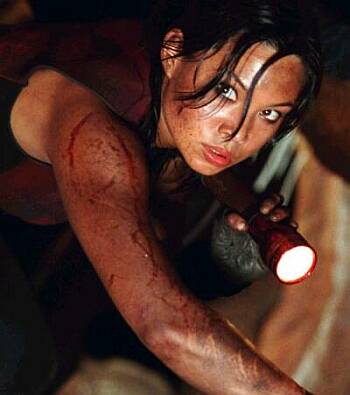 The focus of the film is Juno and Sarah, with the rest of the cast largely reduced to cannon-fodder – though not badly-drawn cannon-fodder, I must admit. Juno is a near-Amazon, while Sarah has to become one, simply in order to survive, and that’s about the extent of the character development here. Demureness, beauty, the ability to bear babies, and all other typical “feminine” traits, are of absolutely no use whatsoever. The ability to drive your pick-axe, repeatedly, into the head of pissed-off Gollum wannabes, on the other hand… Yeah, that will help. But in another interesting contrast to Dog Soldiers, sisterly teamwork is notable by its absence. In the end, the women do almost as much damage on themselves, as the monsters.
The focus of the film is Juno and Sarah, with the rest of the cast largely reduced to cannon-fodder – though not badly-drawn cannon-fodder, I must admit. Juno is a near-Amazon, while Sarah has to become one, simply in order to survive, and that’s about the extent of the character development here. Demureness, beauty, the ability to bear babies, and all other typical “feminine” traits, are of absolutely no use whatsoever. The ability to drive your pick-axe, repeatedly, into the head of pissed-off Gollum wannabes, on the other hand… Yeah, that will help. But in another interesting contrast to Dog Soldiers, sisterly teamwork is notable by its absence. In the end, the women do almost as much damage on themselves, as the monsters.
The technical aspects are great, with set design and cinematography particularly worthy of praise. An uncomfortable feeling of being trapped in a dark, enclosed space has rarely been better captured; the only light present is what the explorers bring, and it gradually becomes less and less effective for their needs. It is occasionally chaotic, and a combination of limited illumination and the incidents that befall the characters often make it easy to lose track of who’s who. That aside, however, this is a seriously kick-ass film, and the prospect of The Descent 2 would be extremely welcome here (though particularly in the British cut, somewhat unlikely…). I’m thinking, in that one, our heroine could perhaps get talked into leading a team of marines back into the monsters’ lair… Stop me if you’ve heard that one before. :-)
Dir: Neil Marshall
Star: Shauna Macdonald, Natalie Mendoza, Alex Reid, Saskia Mulder
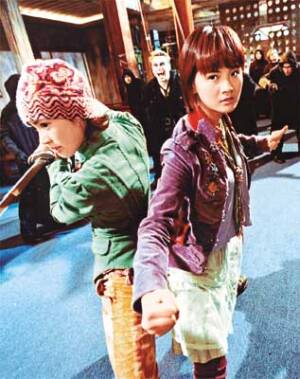 For something crafted largely as a vehicle for its two female, pop-singing stars (the titular Twins), this is much better than you’d expect – compare, say, any Mary-Kate and Ashley film. Sure, it’s dumb. Sure, it’s loaded with cheesy romance and totally unnecessary celebrity cameos. But it also has more fun with the vampire genre than any movie since the original Buffy, and the action, directed by the hugely under-rated Donnie Yen, is far superior.
For something crafted largely as a vehicle for its two female, pop-singing stars (the titular Twins), this is much better than you’d expect – compare, say, any Mary-Kate and Ashley film. Sure, it’s dumb. Sure, it’s loaded with cheesy romance and totally unnecessary celebrity cameos. But it also has more fun with the vampire genre than any movie since the original Buffy, and the action, directed by the hugely under-rated Donnie Yen, is far superior.




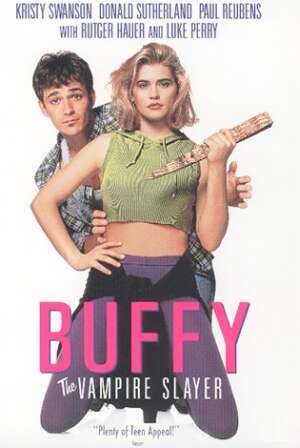 Buffy may be the only successful TV series based upon a failed film. A critical and commercial flop, creator Joss Whedon just wouldn’t let it lie, and finally got the mix of drama, horror, comedy and action he wanted in the show. The movie is a different matter, and has not aged well. The SoCal culture now seems incredibly dated, and Swanson takes too long to become the sympathetic heroine essential to the film. It also has no idea what to
Buffy may be the only successful TV series based upon a failed film. A critical and commercial flop, creator Joss Whedon just wouldn’t let it lie, and finally got the mix of drama, horror, comedy and action he wanted in the show. The movie is a different matter, and has not aged well. The SoCal culture now seems incredibly dated, and Swanson takes too long to become the sympathetic heroine essential to the film. It also has no idea what to 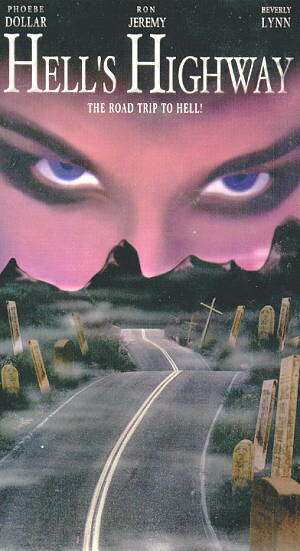 Chris’s chicken parmigiana is legendary here for its narcotic effect: eat it, fall asleep, simple as that. It thus perhaps means more than it seems that Hell’s Highway kept me awake, post-parmigiana. Sure, it’s cheap (cost about $5K, shot on video); sure, it’s dumb – but to counter that chicken, a film must have
Chris’s chicken parmigiana is legendary here for its narcotic effect: eat it, fall asleep, simple as that. It thus perhaps means more than it seems that Hell’s Highway kept me awake, post-parmigiana. Sure, it’s cheap (cost about $5K, shot on video); sure, it’s dumb – but to counter that chicken, a film must have 

 Simplicity is under-rated, especially when it comes to genre films. The simplest horror movies often work the best, because they prey on widely-held fears: monsters (Jaws), getting lost (The Blair Witch Project) or claustrophobia (Below). And now, we get The Descent, which combines all three into one ball of nerves, pitting six female cave-explorers against
Simplicity is under-rated, especially when it comes to genre films. The simplest horror movies often work the best, because they prey on widely-held fears: monsters (Jaws), getting lost (The Blair Witch Project) or claustrophobia (Below). And now, we get The Descent, which combines all three into one ball of nerves, pitting six female cave-explorers against  The focus of the film is Juno and Sarah, with the rest of the cast largely reduced to cannon-fodder – though not badly-drawn cannon-fodder, I must admit. Juno is a near-Amazon, while Sarah has to become one, simply in order to survive, and that’s about the extent of the character development here. Demureness, beauty, the ability to bear babies, and all other typical “feminine” traits, are of absolutely no use whatsoever. The ability to drive your pick-axe, repeatedly, into the head of pissed-off Gollum wannabes, on the other hand… Yeah, that
The focus of the film is Juno and Sarah, with the rest of the cast largely reduced to cannon-fodder – though not badly-drawn cannon-fodder, I must admit. Juno is a near-Amazon, while Sarah has to become one, simply in order to survive, and that’s about the extent of the character development here. Demureness, beauty, the ability to bear babies, and all other typical “feminine” traits, are of absolutely no use whatsoever. The ability to drive your pick-axe, repeatedly, into the head of pissed-off Gollum wannabes, on the other hand… Yeah, that 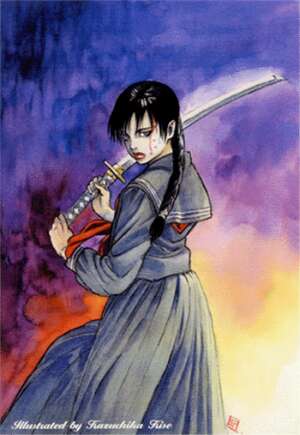 Don’t believe the running time: listed at 83 minutes on the DVD sleeve, this is actually under 50, a nasty piece of marketing to make you think you’re getting a full-length movie. Not sure whether an extra 25 minutes would help or harm here: there is certainly room for development, but equally, there is an awful lot of slack which seems designed only to show off whizzy digital animation. Saya is a vampire. She’s also a killer, tasked by…well, it’s never quite made clear
Don’t believe the running time: listed at 83 minutes on the DVD sleeve, this is actually under 50, a nasty piece of marketing to make you think you’re getting a full-length movie. Not sure whether an extra 25 minutes would help or harm here: there is certainly room for development, but equally, there is an awful lot of slack which seems designed only to show off whizzy digital animation. Saya is a vampire. She’s also a killer, tasked by…well, it’s never quite made clear 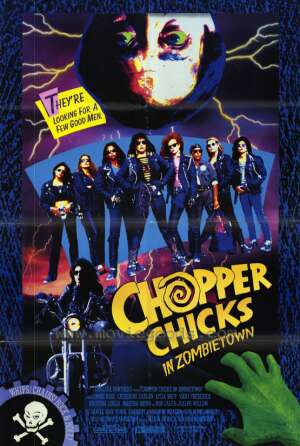 The Cycle Sluts motorcycle gang roar into town, to the consternation and distaste of locals, who drive them off. This decision is regretted soon afterwards, when they come under siege from the walking dead, raised to work in the local mine – a plot stolen from Hammer’s Plague of the Zombies – by the local mortician (Calfa) and his midget assistant. Luckily, the girls are still near, and can assist the townsfolk, including Billy Bob Thornton, who plays a redneck hick, proving it’s possible to be stereotyped
The Cycle Sluts motorcycle gang roar into town, to the consternation and distaste of locals, who drive them off. This decision is regretted soon afterwards, when they come under siege from the walking dead, raised to work in the local mine – a plot stolen from Hammer’s Plague of the Zombies – by the local mortician (Calfa) and his midget assistant. Luckily, the girls are still near, and can assist the townsfolk, including Billy Bob Thornton, who plays a redneck hick, proving it’s possible to be stereotyped  This comes from Vista Street Entertainment, whom you might remember produced some of the worst entries in the
This comes from Vista Street Entertainment, whom you might remember produced some of the worst entries in the 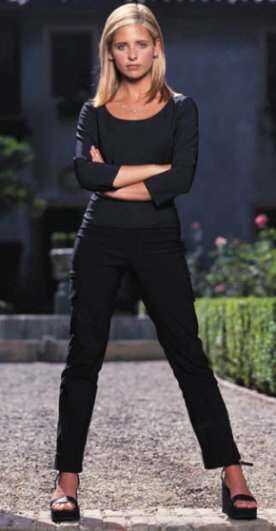 Season Six was in trouble from the start, with the titular heroine (literally) dead and buried. Bringing Buffy back from beyond was a problem always likely to perplex, because once you start resurrecting characters, nothing is a threat any more. Although this was handled moderately well, the show really started to fall apart after the musical episode. This demonstrated one thing beyond all reasonable doubt – why the cast are actors. From then on, most of the stories seemed to have been cribbed from daytime soaps. Buffy has sex with Spike, feels bad about it, then does it again. Xander and Anya’s on-off-off-on-off wedding and relationship. Willow and Tara were no more solidly committed, and the clumsy “magic=drugs” story arc was the sort of thing I’d expect to see on Charmed. In addition, the main bad guys for 90% of the series were a trio of geeks, minor bit players from previous episodes, who were about as threatening as flies, albeit rather more annoying.
Season Six was in trouble from the start, with the titular heroine (literally) dead and buried. Bringing Buffy back from beyond was a problem always likely to perplex, because once you start resurrecting characters, nothing is a threat any more. Although this was handled moderately well, the show really started to fall apart after the musical episode. This demonstrated one thing beyond all reasonable doubt – why the cast are actors. From then on, most of the stories seemed to have been cribbed from daytime soaps. Buffy has sex with Spike, feels bad about it, then does it again. Xander and Anya’s on-off-off-on-off wedding and relationship. Willow and Tara were no more solidly committed, and the clumsy “magic=drugs” story arc was the sort of thing I’d expect to see on Charmed. In addition, the main bad guys for 90% of the series were a trio of geeks, minor bit players from previous episodes, who were about as threatening as flies, albeit rather more annoying.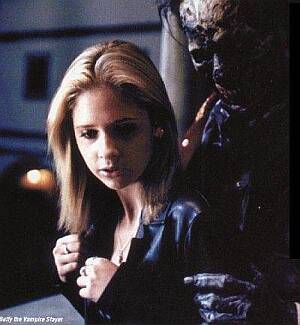 While there have been stand-out Buffy episodes since, season two perhaps ranks as the most consistently high in quality. There’s hardly an episode that ranks as less than excellent, and the writing is sparklingly witty, with more eminently quotable lines than you can shake a stake at.
While there have been stand-out Buffy episodes since, season two perhaps ranks as the most consistently high in quality. There’s hardly an episode that ranks as less than excellent, and the writing is sparklingly witty, with more eminently quotable lines than you can shake a stake at.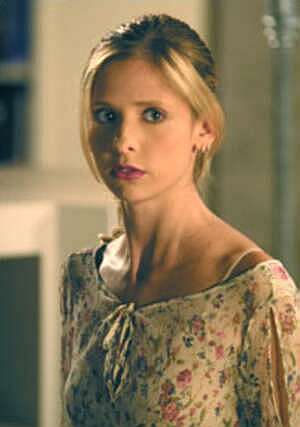 Hannigan and Brendon claim to have learned about the show’s demise in Entertainment Weekly, but it was apparent early on that Gellar in particular was going through the motions. Whedon too, seemed to have lost interest, and you know a show is in trouble when they drag back characters from previous series, who seem ten times more interesting than the regulars. The thrust this season was towards a confrontation with the ultimate evil. Oh, my: an apocalypse – how original. And look! It’s a vampire with a soul! Pushing Buffy back into the school environment was another admission that the show had lost its way when it “graduated”, abandoning the whole concept which had powered it early on. It never found a replacement, floundering around in search of a point.
Hannigan and Brendon claim to have learned about the show’s demise in Entertainment Weekly, but it was apparent early on that Gellar in particular was going through the motions. Whedon too, seemed to have lost interest, and you know a show is in trouble when they drag back characters from previous series, who seem ten times more interesting than the regulars. The thrust this season was towards a confrontation with the ultimate evil. Oh, my: an apocalypse – how original. And look! It’s a vampire with a soul! Pushing Buffy back into the school environment was another admission that the show had lost its way when it “graduated”, abandoning the whole concept which had powered it early on. It never found a replacement, floundering around in search of a point.